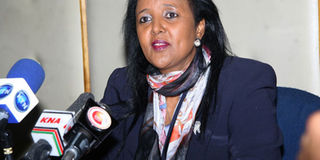Amina sets out to woo the UN

Foreign Affairs Cabinet Secretary Amina Mohammed. She has travelled to Prague for talks with delegates from the five permanent members of UN Security Council, as part of the push to defer ICC against President Kenyatta and his Deputy William Ruto. PHOTO/FILE
What you need to know:
- Foreign Affairs minister set to hold talks with delegates from the five permanent members of the Security Council
- Uhuru to dispatch Balala to Russia, China to seek support for ICC case deferral
Foreign Affairs Cabinet Secretary Amina Mohamed has travelled to Prague for talks with delegates from the five permanent members of UN Security Council, as part of the push to defer ICC against President Kenyatta and his Deputy William Ruto.
The delegates from the US, the UK, France, Russia and China are meeting in the capital of the Czech Republic, and sources said Ms Mohamed was tasked to persuade them to positively receive the application for the Kenya cases to be put on hold.
Kenya sent its application to the UN headquarters in New York in line with a resolution reached by African Union member states in Addis Ababa at the weekend.
The five countries have veto powers and wield considerable influence, which can determine the decision to be taken by the UN Security Council.
MEET FRENCH DELEGATION
One of Ms Mohamed’s main tasks on the sidelines of the Prague talks is to meet the French delegation in the wake of the strong statement issued by President Francois Hollande that any problems that the AU may have should be resolved within the rules and procedures of the ICC.
Sources revealed that President Kenyatta requested his South African counterpart Jacob Zuma to throw in a good word during his meetings with the French President, who visited Johannesburg earlier this week.
From the Czech Republic, Ms Mohamed will hop over to London to meet Foreign Secretary William Hague. So far, government sources have indicated Britain is playing hard ball— keeping away from meeting with government officials over the deferral bid by Kenya.
Before she flew to Prague, Ms Mohamed met US Ambassador Robert Godec to seek the assistance of Washington in securing the deferral of the cases.
It is understood Ms Mohamed played the terrorist card, especially in the face of the attack on the Westgate Shopping Mall in Nairobi, arguing that the Jubilee leaders can only fight terrorism if they were spared the yoke of ICC cases.
President Kenyatta is also to dispatch Mining Cabinet Secretary Najib Balala to China and Russia to seek their support in the deferral of the two cases.
It is instructive that Mr Balala accompanied the President to attend the AU meeting in Addis at the weekend.
The meeting, which failed to declare the mass withdrawal from the ICC due to assistance from French-speaking AU members, was unanimous that President Kenyatta should not attend his trial scheduled to begin on November 12. They also declared that the ICC should keep its hands off serving presidents.
The Special Summit, chaired by AU chairman Hailemariam Dessalegn, agreed to send a delegation of five presidents to the UN Security Council to push for the deferral of the cases.
Following the AU resolutions, which hauled the ICC over live coal, UN spokesman Martin Nesirky said legal advisers of the world body’s boss Ban Ki-Moon were studying the union’s position.
Lobbying for and against the deferral of the cases is expected to heighten in the next days after the submission of the letter to the UN.
However, the Coalition for the ICC— a New York-based lobby group — urged the UN Security Council to reject the deferral as it accused the AU of voting to stand with impunity.
In a statement yesterday, the group said the decision by the “poorly attended” AU extraordinary meeting was a step backwards in the continent’s fight against impunity.
“The summit was extraordinary mostly in its failure and disappointments,” stated William Pace, convenor of the Coalition for the ICC.
He accused African presidents of conspiring to shield each other from the atrocities they have meted to their citizens by trying to block the work of the ICC.
“For the last five years, anti-ICC African summit declarations have focused on trying to protect sitting presidents from being prosecuted for crimes against humanity committed in armed conflicts on their territories, while ignoring the AU Charter and the millions of victims, mostly women and children,” he said.
Mr Kenyatta, Mr Ruto and Mr Joshua arap Sang are facing charges of crimes against humanity arising from the 2007/8 post election violence in which 1,133 people were killed and another 650,000 displaced.





